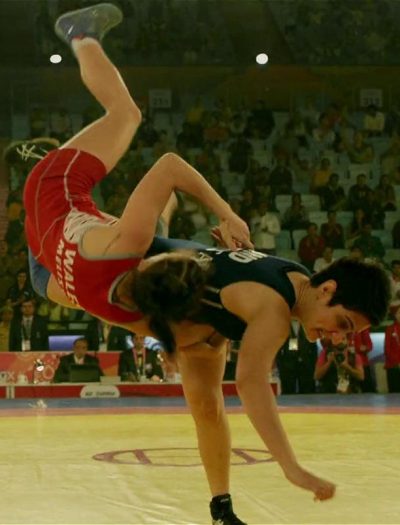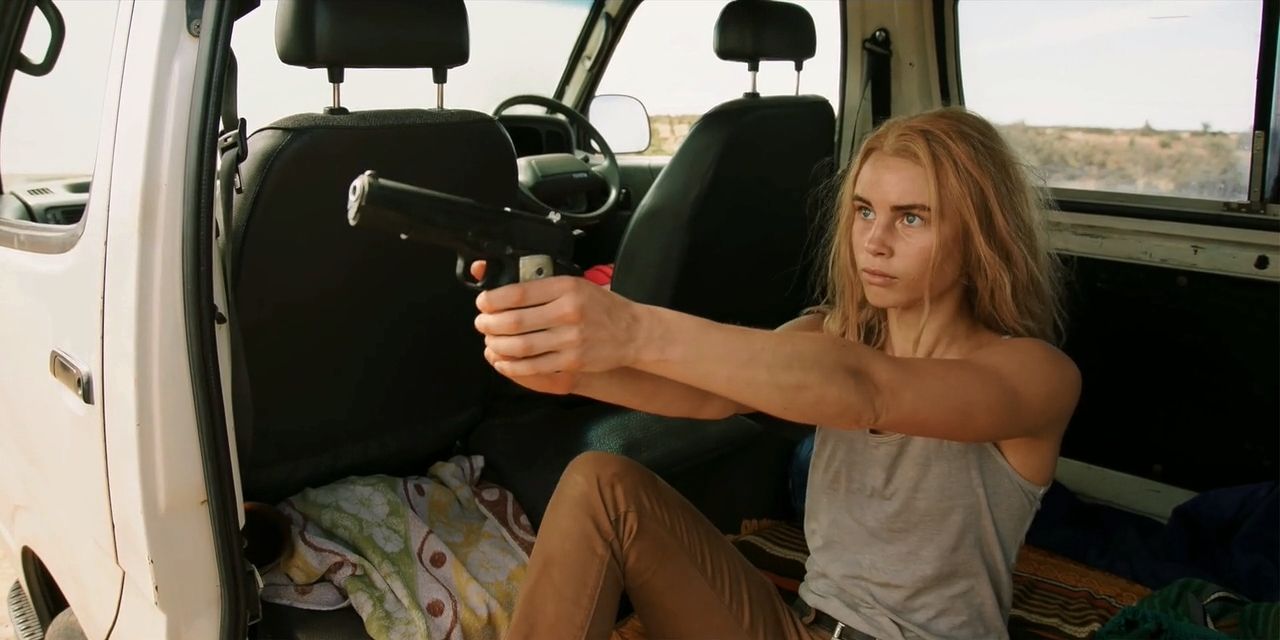 ★★★★
★★★★
“The dark side of Crocodile Dundee.”
 Here is a confession: I have never seen the acclaimed two Wolf Creek movies (2005 and 2013 – a third movie is planned). The reason was simple: I just didn’t care for ultra-cruel slashers from Australia. After watching this TV-spin off I might revise my opinion and catch up with them; if they are as good as this TV series I definitely want to see them!
Here is a confession: I have never seen the acclaimed two Wolf Creek movies (2005 and 2013 – a third movie is planned). The reason was simple: I just didn’t care for ultra-cruel slashers from Australia. After watching this TV-spin off I might revise my opinion and catch up with them; if they are as good as this TV series I definitely want to see them!
So, what’s the story? The American Thorogood family is on holiday in Australia. Unfortunately for them, their young son is swimming in a crocodile-infested lake (who goes swimming in Australia? Don’t we all know their waters are full of deadly animals?). Fortunately for them, Australian animal hunter Mick Taylor (John Jarratt) arrives, right on time, to shoot the crocodile before it can attack the boy. Unfortunately for them, Mick is a psychopathic sadistic serial killer who kills them all before the evening is over, including daughter Eve (Lucy Fry). Or so he thinks, because Eve survives. As she is slowly nursed back to health, and answers the questions of the police, she comes to the realization that the authorities won’t be able or willing to catch the killer.
She decides to hunt Mick herself and take revenge for the death of her family. Eve is originally innocent, and carries feelings of guilt, since her family was only in Australia because she was recovering from drug addiction – she used to be an athlete. She has to learn to get along in a hard, merciless country by herself, and avoid or defeat the criminals, thieves and would-be-rapists there who pose a threat during her journey. Eve is pursued by the police, as she herself has broken the law, and also by a well-meaning policeman who wants to help her. Not to mention Mick who – happily slashing his way through unpopulated areas – has realized that someone is pursuing him and starts to play a cat-and-mouse-game with Eve…
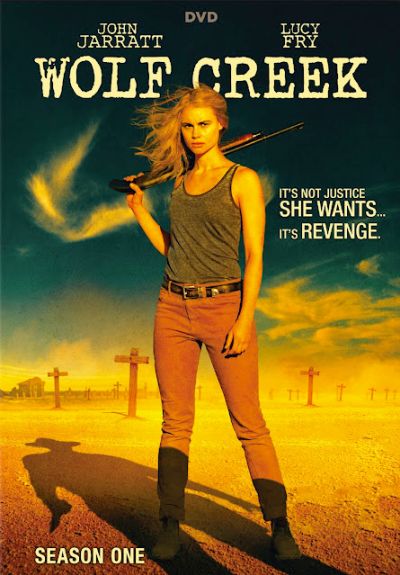 I have to say that this series really surprised me. I had bought it based solely due to the cool cover photo and didn’t expect much more than a probably over-gruesome third-rate slasher, I mean, is Australia really famous for great serial killer psycho thrillers? Though there is the very good Stacy Keach and Jamie Lee Curtis thriller from 1981, Road Games. As a matter of fact, this short (six episodes) series blew me away with its astounding quality. When you read the above, you might be forgiven for getting the impression the whole thing will come across as a bit cheap in its storytelling, or the motivation of its characters – a bit schlocky in general.
I have to say that this series really surprised me. I had bought it based solely due to the cool cover photo and didn’t expect much more than a probably over-gruesome third-rate slasher, I mean, is Australia really famous for great serial killer psycho thrillers? Though there is the very good Stacy Keach and Jamie Lee Curtis thriller from 1981, Road Games. As a matter of fact, this short (six episodes) series blew me away with its astounding quality. When you read the above, you might be forgiven for getting the impression the whole thing will come across as a bit cheap in its storytelling, or the motivation of its characters – a bit schlocky in general.
But… it isn’t.
The best way I can describe the show is with the word “unpretentious”. That might sound strange. Yes, it is, at its core, a revenge story. And, yes, people are tortured and killed in cruel ways: when someone has an infected hand, you see him cut it off with a saw. But I never got the feeling these scenes were gratuitous or to make the blood-thirsty gorehounds happy. Quite the opposite: things like this are carefully integrated into the narrative of the story, and have a meaning that goes above mere shock value. I would almost call this story, about a serial killer tracking his prey across desert hunting grounds, decent and yes, even tasteful – considering how different this narrative could have been presented.
Most surprising for me was, though big game hunter Mick is always looming in the background, it’s mainly Eve’s story. In the beginning I wasn’t too impressed with her. She seemed like a bland, pale character, just a victim who survived a catastrophe. I was half expecting her to become the usual superwoman, who knows it all and can do everything better than every male – thanks, mister! But the filmmakers were smarter than your average Hollywood screenwriter and producer, who nowadays seem only to be able to create one-dimensional, flawless, conveyor-belt manufactured heroines. Eve does not know it all, she can not do it all alone, and makes mistakes – some really terrible. She fails and learns from it. She falls and has to stand up again. It alone makes the character better than almost 95% of today’s female protagonists in American movies or shows. Kudos for that!
Also, there is a second season, which I have not seen yet (it isn’t available in my home country). Given it has everyone’s favourite killer from Down Under again, but not Eve, I began seriously to worry about her fate. You really start to sympathize with her. Running away from the police in the beginning might be anything but rational, but as the series develops, so does she. You start to understand who she is, and she gets a backstory: she is not a random female character out for revenge anymore. She has these understandable feelings and more than once I thought: “Gosh, this could be going different, girl. You should be working together with the police. There could be common ground if you were not so stuck on the idea that you’ve got to do this all on your own!”
Then there are moments when she realizes herself she is way over her head, fighting insurmountable odds. She gets better at it, slowly, and the point in a way is about self-discovery. It becomes an odyssey for oneself, where the protagonist has to question when reaching the nadir of life: What am I standing for? Why do I do what I do? Is it really worth all that? Could I choose a different life? There are moments that indicate that Eve might give up her hunt. The series repeatedly contrasts her persona with other characters who have lost themselves, who may have been destroyed by this vast open country where you seem to be far from civilization or God.
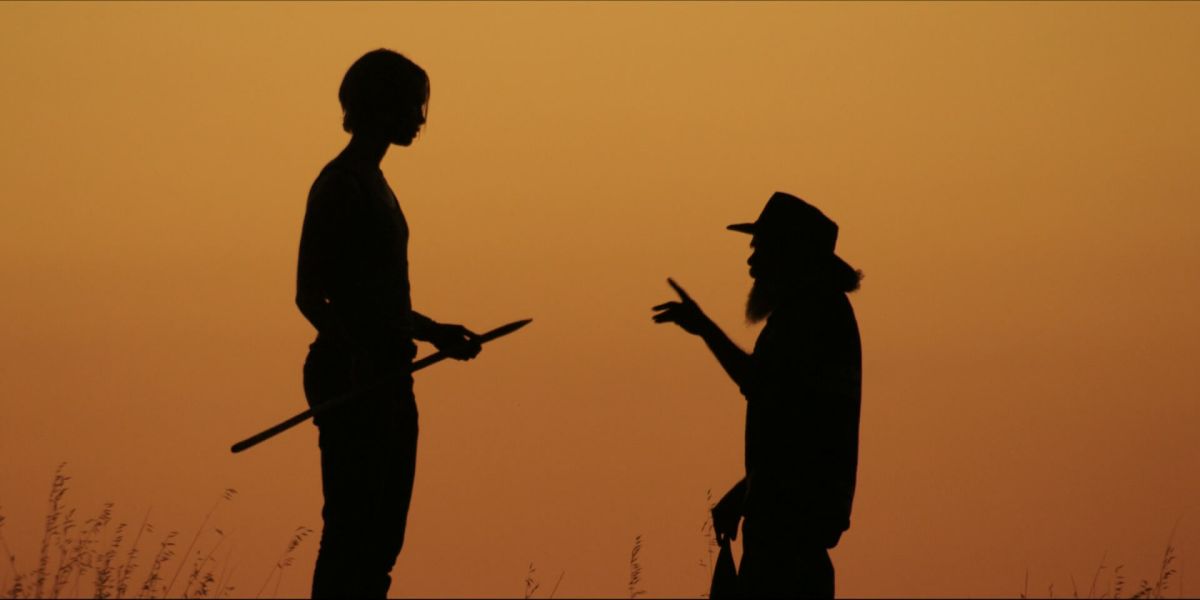 Eve is repeatedly confronted by these criminals, or wanna-be-rapists who see a normal dressed woman as an offer, and experiences family tragedies that actually form the core of the narrative. She is not without help though. As well as the policeman on her trail who reluctantly starts to cover-up for her, there is a criminal whom she meets in the desert, an old Aborigine who fits into the classic mentor role, a colleague in a bar and she even gets a canine companion. Though the question always lingers while watching the show: Will she get her revenge? What will she do when meeting the man who killed her family? Does she even have a chance against an experienced, sadistic killer like Mick?
Eve is repeatedly confronted by these criminals, or wanna-be-rapists who see a normal dressed woman as an offer, and experiences family tragedies that actually form the core of the narrative. She is not without help though. As well as the policeman on her trail who reluctantly starts to cover-up for her, there is a criminal whom she meets in the desert, an old Aborigine who fits into the classic mentor role, a colleague in a bar and she even gets a canine companion. Though the question always lingers while watching the show: Will she get her revenge? What will she do when meeting the man who killed her family? Does she even have a chance against an experienced, sadistic killer like Mick?
So, yes, I applaud Lucy Fry’s performance in the role. Thanks to an excellent script, it made me believe she – albeit slowly- becomes a potential threat to the seasoned serial killer. But also John Jarrat, playing this role for a third time, is incredibly good. Mick Taylor is a nightmare of a character, superficially charming, but essentially a disgusting sleazebag. Though it’s great even he has been given a backstory. While he kills the way other people drink their morning coffee, we get to know enough about him to deduce how he became that way. An episode tells us in flashback about a key event in his childhood that may have been the catalyst for his murderous doings. If this is believable is up to the viewer, I think. I like it they gave him more than the “Well, he’s insane” explanation so many movies and shows tend to give their killers nowadays.
Having Eve faced with what can only be labelled as a devil in human form, touches an even more ambitious question. It’s a theme that classic The Hitcher (C. Thomas Howell and Rutger Hauer) dared to ask. How much of your own humanity do you have to leave behind, to be able to fight the devil? I think it refers to the age-old Nietzsche-ism “If you gaze long enough into an abyss, the abyss will gaze back into you.” I’m not saying how this “psycho thriller” ends, but I really, really recommend this show. Every episode had me glued to my TV, and I got much more enjoyment out of this short Australian TV show than I imagined. Also, I think it’s far superior to your average American product playing in the same genre pool.
I really feel I should get my hands on season 2, even though the main actress won’t be back. Also, I look forward to the third movie – and I wish you happy hunting! 😉
Creator: Greg McLean
Star: Lucy Fry, John Jarratt, Dustin Clare, Jessica Tovey
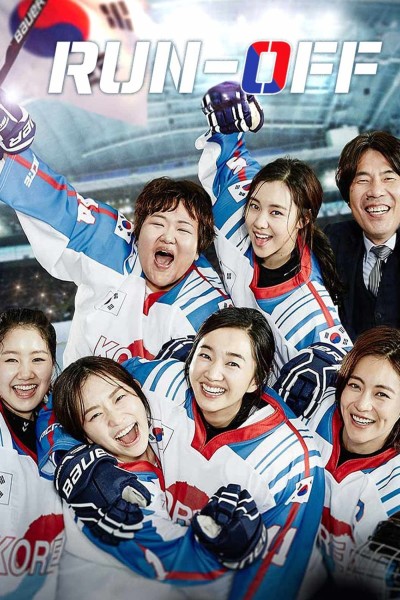 It feels as if South Korea is going through all the Olympic sports, making films based on each of them. Indeed, this film’s alternate title makes it a sequel to Take Off, about ski-jumping. I’ve seen two of the previous entries, covering archery (3 Heroines) and table tennis (As One), with the latter the more successful. This one comes up shorter than either. Less due to the technical side, which is always solid and occasionally impressive. However, the “true story” element is riotously inaccurate, the film completely rewriting reality in favor of what is not much more than a series of the most obvious sports movie cliches, for two hours and five minutes of increasingly sappy nonsense.
It feels as if South Korea is going through all the Olympic sports, making films based on each of them. Indeed, this film’s alternate title makes it a sequel to Take Off, about ski-jumping. I’ve seen two of the previous entries, covering archery (3 Heroines) and table tennis (As One), with the latter the more successful. This one comes up shorter than either. Less due to the technical side, which is always solid and occasionally impressive. However, the “true story” element is riotously inaccurate, the film completely rewriting reality in favor of what is not much more than a series of the most obvious sports movie cliches, for two hours and five minutes of increasingly sappy nonsense.




 ★★★★
★★★★ Here is a confession: I have never seen the acclaimed two Wolf Creek movies (2005 and 2013 – a third movie is planned). The reason was simple: I just didn’t care for ultra-cruel slashers from Australia. After watching this TV-spin off I might revise my opinion and catch up with them; if they are as good as this TV series I definitely want to see them!
Here is a confession: I have never seen the acclaimed two Wolf Creek movies (2005 and 2013 – a third movie is planned). The reason was simple: I just didn’t care for ultra-cruel slashers from Australia. After watching this TV-spin off I might revise my opinion and catch up with them; if they are as good as this TV series I definitely want to see them! I have to say that this series really surprised me. I had bought it based solely due to the cool cover photo and didn’t expect much more than a probably over-gruesome third-rate slasher, I mean, is Australia really famous for great serial killer psycho thrillers? Though there is the very good Stacy Keach and Jamie Lee Curtis thriller from 1981, Road Games. As a matter of fact, this short (six episodes) series blew me away with its astounding quality. When you read the above, you might be forgiven for getting the impression the whole thing will come across as a bit cheap in its storytelling, or the motivation of its characters – a bit schlocky in general.
I have to say that this series really surprised me. I had bought it based solely due to the cool cover photo and didn’t expect much more than a probably over-gruesome third-rate slasher, I mean, is Australia really famous for great serial killer psycho thrillers? Though there is the very good Stacy Keach and Jamie Lee Curtis thriller from 1981, Road Games. As a matter of fact, this short (six episodes) series blew me away with its astounding quality. When you read the above, you might be forgiven for getting the impression the whole thing will come across as a bit cheap in its storytelling, or the motivation of its characters – a bit schlocky in general. Eve is repeatedly confronted by these criminals, or wanna-be-rapists who see a normal dressed woman as an offer, and experiences family tragedies that actually form the core of the narrative. She is not without help though. As well as the policeman on her trail who reluctantly starts to cover-up for her, there is a criminal whom she meets in the desert, an old Aborigine who fits into the classic mentor role, a colleague in a bar and she even gets a canine companion. Though the question always lingers while watching the show: Will she get her revenge? What will she do when meeting the man who killed her family? Does she even have a chance against an experienced, sadistic killer like Mick?
Eve is repeatedly confronted by these criminals, or wanna-be-rapists who see a normal dressed woman as an offer, and experiences family tragedies that actually form the core of the narrative. She is not without help though. As well as the policeman on her trail who reluctantly starts to cover-up for her, there is a criminal whom she meets in the desert, an old Aborigine who fits into the classic mentor role, a colleague in a bar and she even gets a canine companion. Though the question always lingers while watching the show: Will she get her revenge? What will she do when meeting the man who killed her family? Does she even have a chance against an experienced, sadistic killer like Mick?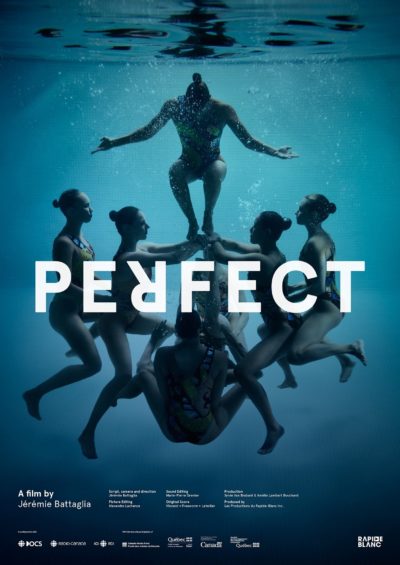 When I reviewed Russian fencing film
When I reviewed Russian fencing film 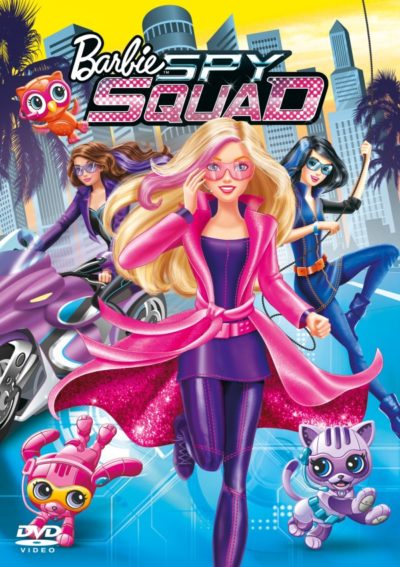 Ah, the things I watch for you people. Safe to say, this probably hit new heights of “I am not the target demographic”, but it’s hard to argue it is outside the remit of the site. To the film’s credit, this is not as bad as I feared it might be. If I had an eight-year-old daughter – such a shame this turned up about 25 years too late! – there would be far worse things to have inflicted on me. Not that I’ll exactly be chasing down any of the other
Ah, the things I watch for you people. Safe to say, this probably hit new heights of “I am not the target demographic”, but it’s hard to argue it is outside the remit of the site. To the film’s credit, this is not as bad as I feared it might be. If I had an eight-year-old daughter – such a shame this turned up about 25 years too late! – there would be far worse things to have inflicted on me. Not that I’ll exactly be chasing down any of the other  To my surprise, when I begin researching this film, it appears actually to be based – at least, somewhat – in reality. I give you
To my surprise, when I begin researching this film, it appears actually to be based – at least, somewhat – in reality. I give you  Halfway through the final installment, Chris came in. She paused, watching for a moment, then said, “They spend far too much time talking, and not enough time killing.” Just a shame she waited 93 episodes to express so succinctly one of the main problems with the series. For, even if the final arc had its share of bloodshed, if you average it out per show, it’s about the level of a mid-strength nosebleed. It certainly put the novela into narconovela. Though the problems began at the start – or, rather, the end of the second series where heroine Sara Aguilar was apparently gunned down. This being a show where escape from death was common, I spent the first 20 episodes waiting for her to return. Spoiler: she doesn’t.
Halfway through the final installment, Chris came in. She paused, watching for a moment, then said, “They spend far too much time talking, and not enough time killing.” Just a shame she waited 93 episodes to express so succinctly one of the main problems with the series. For, even if the final arc had its share of bloodshed, if you average it out per show, it’s about the level of a mid-strength nosebleed. It certainly put the novela into narconovela. Though the problems began at the start – or, rather, the end of the second series where heroine Sara Aguilar was apparently gunned down. This being a show where escape from death was common, I spent the first 20 episodes waiting for her to return. Spoiler: she doesn’t. As I write this, in December 2021, abortion is again a bit of a hot topic on the American political scene. I am, personally, fairly neutral on the topic. Or, at least, to the point that I’d need to spend the entire review outlining my position. Such nuance tends not to fly on the Internet, where you are either a baby-killer or want to turn America into The Handmaid’s Tale, and moderation is for pussies. On that basis, this film is a bit of a losing proposition, likely destined to satisfy no-one with its relative fair-handedness. These days, it feels like everyone just wants their echo chamber reinforced, rather than challenged, even in the mild way this offers.
As I write this, in December 2021, abortion is again a bit of a hot topic on the American political scene. I am, personally, fairly neutral on the topic. Or, at least, to the point that I’d need to spend the entire review outlining my position. Such nuance tends not to fly on the Internet, where you are either a baby-killer or want to turn America into The Handmaid’s Tale, and moderation is for pussies. On that basis, this film is a bit of a losing proposition, likely destined to satisfy no-one with its relative fair-handedness. These days, it feels like everyone just wants their echo chamber reinforced, rather than challenged, even in the mild way this offers.

